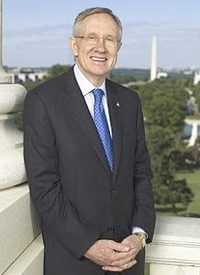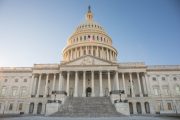
Despite the harsh public outcry against the anti-piracy bills such as the Stop Online Piracy Act (SOPA) and the Protect Intellectual Property Act (PIPA), Senate Majority Leader Harry Reid (left) is forging ahead with yet another Internet regulation bill. This measure is packaged under the guise of cyber-security, but it serves ultimately the same purpose as SOPA and PIPA by providing more authority to the federal government over the Internet. Though the contents of the bill have generally been kept secret, there are some indications that the legislation could be stronger than President Obama’s cybersecurity proposal, released in May 2011. That measure recommended that the Department of Homeland Security be assigned authority over cybersecurity issues related to civilian networks, and that the DHS program be “developed in consultation with privacy and civil liberties experts and with the approval of the Attorney General.”
The Daily Caller reports, “A classified meeting behind closed doors in October 2011 between key Senate committee leaders with jurisdiction over cybersecurity and White House officials, took place at the request of the Obama administration. Lieberman…said that past Senate cybersecurity bills were considerably stronger than the White House proposal.”
Reid’s bill will reportedly expand the Racketeer Influenced and Corrupt Organizations (RICO) Act penalties to cyberspace as well.
Reid has been a major proponent of giving the Department of Homeland Security broader authority, and has criticized bills that fail to adequately authorize the DHS to regulate the Internet, such as the recent House legislation — the Promoting and Enhancing Cybersecurity and Information Sharing Effectiveness Act of 2011 (PrECISE Act) — which gives the DHS power to act in the event of a cyber attack. Reid has maintained that the bill fails to give the DHS enough power.
The Daily Caller contends that Reid prefers a bill that would expand the DHS authority beyond that of currently regulated “critical infrastructure,” to include utilities and financial institutions.
Senator Joseph Lieberman agrees. The Hill reports, “Lieberman said the turf war over which agency should be in charge of implementing the government’s cybersecurity plan has been largely resolved and there is a ‘broad consensus’ that DHS is best suited to the task, with technical and intelligence support from the military and National Security Agency.”
But Paul Rosenzweig of the Heritage Foundation disagrees, asserting that the National Security Agency (NSA) is better equipped to handle matters of cybersecurity, especially as it already works closely with financial institutions to combat hackers. Rosenzweig has actually crafted policy inside of the DHS in the past and contends that a civilian agency best oversees a civilian network.
And though the DHS recently announced it would be hiring 1,000 new cyber experts, Rosenzweig asserts, “But until these new experts are on board (and finding and hiring that many will be a long process), civilian defenses will have to rely on existing expertise that lies predominantly with NSA.”
Reid has made cybersecurity a focal point, and urged Senate Minority Leader Mitch McConnell to do the same, regardless of a lack of bipartisan support. But McConnell believes the best approach to cybersecurity is one that garners bipartisan support.
According to a Senate aide, “Everyone wants to improve cybersecurity, but, if we’ve learned nothing else from previous legislation affecting the Internet, we know that an imposition of an overly broad regulatory regime of the Internet ecosystem will not sit well with the American people.”
McConnell likely still recalls the harsh outcry against SOPA and PIPA from virtually everyone outside of Hollywood and the entertainment industry.
Much of the problem with the two bills is the vagueness of their terms, which could ultimately lead to entire websites being seized and shut down. Some of the felonies defined under the laws could carrying five-year prison sentences.
“Indeed, the bill[s] imposes stiff penalties on anyone who doesn’t [comply], and offers immunity to ad networks and payment processors that follow orders. As such, SOPA is chock-full of incentives for ISPs [Internet Service Providers], content-hosting sites and other such entities to go along with the government’s demands,” writes Omar El Akkad of The Globe & Mail.
A spokesperson for California Republican Rep. Darrell Issa, a leading opponent to both PIPA and SOPA, explains, “The bills eviscerate the proven Digital Millenium Copyright Act protections, forcing Internet service providers, search engines and law-abiding domestic sites to become arms of the Justice Department at home and abroad.”
Over 10,000 websites, including Wikipedia and Google, participated in an Internet blackout on January 18 to showcase their opposition to both bills, prompting users all over Facebook and other social network sites to comment on the legislation and circulate petitions against SOPA. Millions signed the petitions that circulated throughout the Internet.
On the same day as the Internet blackout, the offices of elected officials were flooded with phone calls from Americans criticizing the bills.
But in addition to the opposition of individuals that was still evident on Wednesday, a number of conservative think tanks voiced their criticism of the bills as well, most notably the Heritage Foundation, as well as the conservative blog redstate.com.
Six Republican Senators — Chuck Grassley (Iowa), Orrin Hatch (Utah), Jeff Sessions (Ala.), John Cornyn (Texas), Mike Lee (Utah), and Tom Coburn (Okla.) — considered both bills to be bad ideas and submitted a letter to Senator Reid, which read:
We have increasingly heard from a large number of constituents and other stakeholders with vocal concerns about possible unintended consequences of the proposed legislation, including breaches in cybersecurity, damaging the integrity of the Internet, costly and burdensome litigation, and dilution of First Amendment rights.
The Department of Justice defended the highly unpopular bills, asserting that it needed greater authority to combat the issue of “rogue sites.”
Meanwhile, the Internet has already been violated by the “net neutrality” regulations imposed by the Federal Communications Commission (FCC). The regulations establish FCC jurisdiction over the Internet. TNA’s Alex Newman wrote of the rules:
The new regulations purport to establish FCC jurisdiction over the Internet by giving it authority to dictate how Internet Service Providers (ISPs) do business and to punish companies that do not comply with the executive branch’s decrees. The "Order," as the FCC regulations are being dubbed, also claims to allow FCC bureaucrats to get involved in disputes about how Internet firms are managing their networks.
The FCC regulations were a victory for Democrats, and for President Obama, who nominated FCC Chairman Julius Genachowski with the hopes that he would employ a strategy of implementing net neutrality, a major issue in Obama’s campaign platform. Supporters of the regulations said it was necessary to place the Internet under government control, viewing the Internet as similar to regulated utilities such as water and electricity.
And the White House played a significant role in the policy debate regarding the net neutrality regulations. The Daily Caller explains:
White House Deputy Chief Technology Officer Andrew McLaughlin, was found to have been communicating with representatives of his former employer, Google, through backchannel emails over net neutrality policy. Former FCC Commissioner Michael Copps was found to be in “collusion” over net neutrality policy with activist group Free Press, a group which has received substantial funding from left-leaning foundations.
Additionally, President Obama managed to sign an international treaty that would permit foreign companies to demand that ISPs remove web content in the United States without any legal oversight without significant attention. Entitled the Anti-Counterfeiting Trade Agreement (ACTA), the treaty was signed by President Obama on October 1, 2011, but it is currently a subject of discussion as the White House is circulating a petition demanding that Senators ratify the treaty.
What’s worse is that the White House has done some maneuvering so that the treaty does not have to be confirmed by lawmakers. Instead, it is presenting the treaty as an “executive agreement.” By doing this, the entire legislative process has now been circumvented, and no Senate approval would be sought.
Unfortunately, a desire to control the Internet is not limited solely to Democrats. During the intense debate over SOPA and PIPA, Republican House Judiciary Committee Chairman Rep. Lamar Smith called Wikipedia’s blackout a “publicity stunt” that promotes “fear instead of facts.”
Critics contend that Reid’s sense of urgency to pass yet further Internet regulations is a result of the upcoming presidential election, as Democrats somehow view doing so to be a victory, despite the opposition from the American people.


